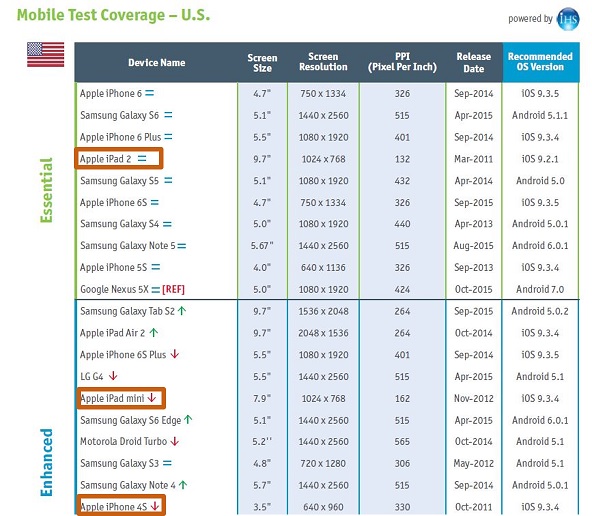StackGen has partnered with Google Cloud Platform (GCP) to bring its platform to the Google Cloud Marketplace.
The recent iOS 10 release raises a lot of questions about how mobile apps will respond to the updated system, and how developers can ensure an untarnished user experience. One of the biggest challenges that development and testing teams are facing is that certain devices have now been made obsolete. iPad 2, iPad 3rd gen, iPad mini, iPhone 4S, iPod touch 5th gen—none of these devices will update to run iOS 10.
With Apple’s decision to withhold the update from these devices the company considers “outdated,” development and testing teams will need to jump through hoops to maintain a quality user experience.
From the recent Perfecto Digital Test Coverage Index report it's clear that at least iPad 2, iPhone 4S and iPad mini are still among the most-used devices in various markets, including the U.S. (see below):

It’s safe to assume that withholding the update from these popular devices may lead to a lower adoption rate for the new OS — large groups of users will continue to use the iPad 2, iPad Mini and iPhone 4S, and will be unable to make the switch. The end result? We're going to see growing iOS fragmentation in various markets, and complex testing ahead.
In preparation for this mobile testing overhaul, developers need to take a look at their existing testing labs and plans, and alter them to fit the new market matrix.
Automate Across Operating Systems
With iOS 10 comes the new version of Mac’s OS Sierra and Safari 10. These new operating systems will need to be tested across iOS 10 devises, and will require additional lab configurations in your overall testing activities. To ensure quality across operating systems, teams should do a full regression of the scripts that were used to run on iOS 9 against iOS 10, and fine tune to make sure the scripts can run on both platforms until the next release.
Test Across Devices
Teams will need to sustain their test automation and development activities on iOS 10 devices and iOS 9 critical devices. This means that teams will need to support the new iPhone 7 and iPhone 7 Plus, along with other Apple devices that will run iOS 10. Unless you have an automated and continuous lab setup to test efficiently across an array of devices, most teams should expect a latency in testing activities.
Ensure Proper Lab Environments
To debug your app across devices, and ensure that it’ll work in parallel across iOS 9 and iOS 10, teams need to prepare environments with the new permutations. This includes both new Safari and Mac OS versions, new Xcode versions for developers, and of course, having new devices, smartphones and tablets with both iOS 9 and iOS 10 tested side by side.
Prepare for Added Complexity with Appium Framework
For teams building tests for iOS using Appium 1.6, things just got a bit more complicated. In iOS 10, Apple dropped its Instruments support and UIAutomation, moving its automation solution towards the new XCUITest framework. This change impacts existing Appium scripts that leverage Apple Instruments and UIAutomation framework, and will cause execution problems and compatibility issues when trying to run them on iOS 10/iPhone 7.
Now consider the growing iOS fragmentation and we’re left with a second layer of complexity. For devices that are no longer supported by iOS 10, existing Appium scripts that use the old UIAutomation framework are still relevant. That means that teams will have to migrate scripts to the new framework, or maintain both the old one for older devices and the new one for newer devices.
As testing roadblocks pop up with the iOS 10 release, end users still expect their mobile apps to perform seamlessly — so it’s time for developers to rise to the challenge.
Eran Kinsbruner is the Technical Evangelist for Perfecto.
Industry News
Tricentis announced its spring release of new cloud capabilities for the company’s AI-powered, model-based test automation solution, Tricentis Tosca.
Lucid Software has acquired airfocus, an AI-powered product management and roadmapping platform designed to help teams prioritize and build the right products faster.
AutonomyAI announced its launch from stealth with $4 million in pre-seed funding.
Kong announced the launch of the latest version of Kong AI Gateway, which introduces new features to provide the AI security and governance guardrails needed to make GenAI and Agentic AI production-ready.
Traefik Labs announced significant enhancements to its AI Gateway platform along with new developer tools designed to streamline enterprise AI adoption and API development.
Zencoder released its next-generation AI coding and unit testing agents, designed to accelerate software development for professional engineers.
Windsurf (formerly Codeium) and Netlify announced a new technology partnership that brings seamless, one-click deployment directly into the developer's integrated development environment (IDE.)
The Cloud Native Computing Foundation® (CNCF®), which builds sustainable ecosystems for cloud native software, is making significant updates to its certification offerings.
The Cloud Native Computing Foundation® (CNCF®), which builds sustainable ecosystems for cloud native software, announced the Golden Kubestronaut program, a distinguished recognition for professionals who have demonstrated the highest level of expertise in Kubernetes, cloud native technologies, and Linux administration.
Red Hat announced new capabilities and enhancements for Red Hat Developer Hub, Red Hat’s enterprise-grade internal developer portal based on the Backstage project.
Platform9 announced that Private Cloud Director Community Edition is generally available.
Sonatype expanded support for software development in Rust via the Cargo registry to the entire Sonatype product suite.
CloudBolt Software announced its acquisition of StormForge, a provider of machine learning-powered Kubernetes resource optimization.













